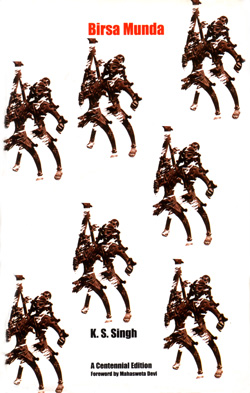Birsa Munda
and his Movement (1872-1901)
A study of a Millenium
Movement in Chotanagpur
K. S. Singh
Foreword by Mahasweta Devi
5.75 x 9 inches, xxvii +324pp, 3 halftones. 2002
ISBN : 9788170462057
Rs 625.00 (HB)
$35.00 (HB)
£25.00 (HB)
’When about forty years ago I wrote the story of this man and his movement-in fact I had used Birsa Munda as a metaphor to tell the story of his people’s struggle-little had I realized that it would have such a far-reaching impact on subaltern studies and in tribal politics’.— K. S. Singh
This work is a complete account of probably the best-known millenarian movement in tribal India. The movement of the Mundas led by Birsa was typical of the resistance and revitalization movements in the latter half of the nineteenth century. A combination of a religious and a political movement, it represented the struggle and aspirations of his people, sowing the first stirrings of nationalism among them and featuring an urge to recreate the old world which had disappeared under the onslaught of colonialism.
Since the second revised edition of Birsa Munda and His Movement was published in 1983, the Birsa cult has developed further, and Birsa Munda has emerged as the icon of the tribal people all over India. His movement Ulgulan (the upheaval) has been appropriated by all sorts of people, and by all political parties in Chhotanagpur to further their agenda. The legend of the lad from Chalkad has travelled far and wide; and his portrait hangs in the Central Hall of Parliament, the only tribal leader to have been so honoured.
Acclaimed as the first of its kind, this study is based on anthropological data and archival material. It traces Birsa’s early life and his transformation into a ’black Christ’ against the background of the processes of transformation of the tribal society of Chhotanagpur. His political movement and his religion are closely studied in the context of their impact on the course of history. The book was translated into various languages of the country and inspired various forms of creative adaptation in contemporary folk and regional literature, including Mahasweta Devi’s major novel Aranyer Adhikar.
This centennial edition, being published by Seagull to mark the centenary of the martyrdom of Birsa Munda, which is also the third edition in English, restores official documents and maps which appeared in the first edition, and includes a rare photograph of Birsa Munda, contemporary missionary accounts, and additions to the bibliography, besides a fresh updating of the Birsa story as it is seen today.
K. S. Singh, formerly of the Indian Administrative Service, spent many years in the Jharkhand region serving and studying tribal people. He has researched and written extensively on tribes, their history and anthropology including movements, economy, customary law, literature, folklore, poetry, policy and programmes, famine and drought management and development administration. Among his well-known works are The Indian Famine 1967: A Study in Crisis and Change (1974), Birsa Munda and his Movement (1983), Tribal Society in India: An Anthropo-Historical Perspective (1985) and the introduction to People of lndia (1992/2002). The last book is part of his magnum opus, the 43 volume project on the people of India, based on the first pan-Indian survey of all communities of India, conceptualized, spearheaded, and edited by him, as Director General of Anthropological Survey of India (1984-93). He was National Professor at the Rajiv Gandhi Chair on Protective Discrimination, North-Eastern Hill University, Shillong (1998-2000). He was associated with the conceptualization, designing and establishment of the first National Museum of Anthropology of which he was the first Director General (1984-85) and with several innovative developmental cultural and disaster management projects. He was recipient of the Jawaharlal Nehru Fellowship (1970-72), Birsa Munda Award (1986) for the services rendered to the tribal people, and Prof. G. S. Ghurye Award (1995) for the book The Scheduled Tribes.
Selected Works Of Mahasweta Devi
History
Culture Studies

 Buy (HB)
Buy (HB)